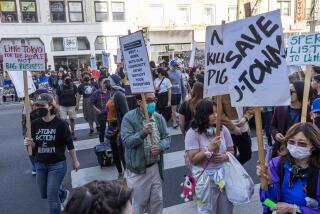Debate Over Paying Reparations to Japanese-American Internees
Anticipating the usual racial rhetoric that seems to accompany the reparation issue, let me point out a few pertinent facts:
1. Those placed in the relocation camps were native-born American citizens and permanent residents, not Japanese nationals. The only reason the permanent U.S. residents were not naturalized citizens is because they were prohibited from naturalization by an act of Congress based on race.
2. Those people placed in the camps were never under any government agency suspicion of being a threat to the national security. Anyone who was under suspicion had already been detained by the FBI and other security forces immediately after the attack on Pearl Harbor. All Japanese intelligence operatives had been revealed prior to Pearl Harbor when naval intelligence burglarized the Japanese Consulate in Washington, D.C., and photographed documents listing all those operatives. The FBI had also been keeping anyone suspected of aiding the Japanese prior to Pearl Harbor and promptly incarcerated those people after the attack. J. Edgar Hoover said that the relocation camps were unnecessary since all suspects were already in custody.
3. Those in the relocation camps were eventually allowed to leave the camps for outside jobs anywhere in the United States except the West Coast and volunteers were taken into the armed forces to distinguish themselves in the 442nd and 100th Special Combat Teams and in the military intelligence service.
Taking these and other facts into consideration, it is safe to assume that the victims of the relocation camps were in no way responsible for any of the actions Japan had perpetrated against the U.S. during World War II. Japanese-United States relations are irrelevant to the relocation camp reparation issue. This is solely an issue of an unjust action taken by the U.S. against its own citizenry.
GARY YAMASHITA
Culver City
More to Read
Sign up for Essential California
The most important California stories and recommendations in your inbox every morning.
You may occasionally receive promotional content from the Los Angeles Times.










